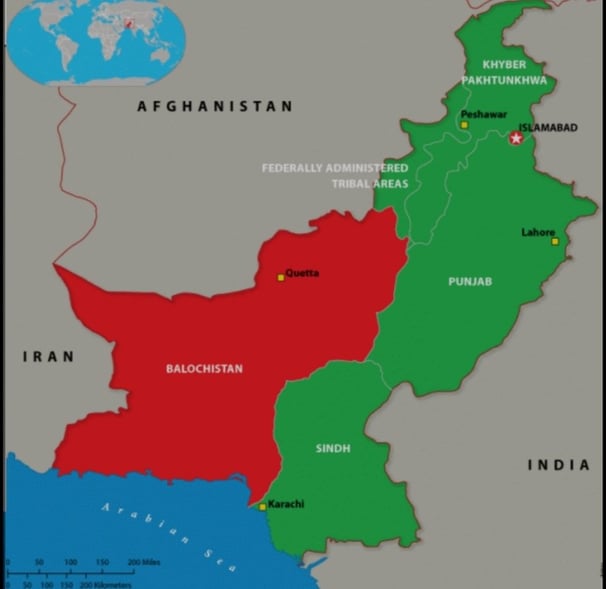Balochistan Independence Claims: Fact-Checking the Viral Narrative
LATEST NEWS


On May 14, 2025, social media platforms buzzed with claims of Balochistan declaring independence from Pakistan, fueled by Baloch activist Mir Yar Baloch’s bold statements and the Baloch Liberation Army’s (BLA) intensified attacks. The hashtag #RepublicOfBalochistan trended as users shared maps and videos of Baloch flags, with some urging India and the UN to recognize a "Democratic Republic of Balochistan." But how much of this narrative holds up under scrutiny? Let’s fact-check the claims and explore the reality behind Balochistan’s alleged freedom.
The Claim: Balochistan Declared Independence
Mir Yar Baloch declared Balochistan’s independence on May 9, 2025, citing decades of violence, enforced disappearances, and human rights abuses by Pakistan. He claimed the "people of Balochistan have given their national verdict" and requested India to allow a Baloch embassy in Delhi, while also urging the UN to recognize the region as a sovereign state. Social media amplified this with visuals of an independent Balochistan map and flag-waving crowds, suggesting a new nation had emerged.
Fact-Check: Symbolic, Not Official
While Mir Yar Baloch’s declaration is real, it lacks official recognition. No country, including India or the UN, has acknowledged Balochistan as an independent state as of May 14, 2025. Pakistan maintains control over the region, despite the BLA’s claims of seizing areas like Mangochar in Kalat district. The declaration aligns with Balochistan’s long-standing separatist movement—dating back to its annexation by Pakistan in 1948—but it remains symbolic. Historically, Baloch leaders claimed independence on August 11, 1947, before British withdrawal, but this was never internationally recognized either. The current claim, while emotionally charged, does not equate to a realized sovereign state.
The Claim: BLA’s Operation Herof Signals Control
The BLA claimed responsibility for 71 coordinated attacks across 51 locations in Balochistan under "Operation Herof," targeting Pakistani military and infrastructure. Some reports suggest the BLA has seized control of areas like Mangochar, indicating a shift toward Baloch governance.
Fact-Check: Escalation, Not Domination
The BLA’s attacks are verified, with strikes on military posts, gas fields in Dera Bugti, and key infrastructure. However, the extent of their control is unclear. While the BLA claims to hold Mangochar, no independent sources confirm they govern the area or have established administrative authority. Pakistan’s military, despite losses, continues to assert dominance, with General Asim Munir downplaying the unrest as the work of “1,500 individuals.” Balochistan remains a conflict zone, not a liberated state, though the BLA’s actions signal a significant escalation in their insurgency.
The Claim: Global Support for Balochistan’s Independence
Mir Yar Baloch and social media campaigns have called for international support, with some posts claiming Balochistan’s independence is gaining global traction. Appeals to India and the UN for recognition, alongside invitations to friendly states for an independence ceremony, suggest growing momentum.
Fact-Check: No International Backing Yet
There’s no evidence of international support for Balochistan’s independence. Neither India nor the UN has responded officially to Mir Yar Baloch’s requests. India’s recent Operation Sindoor, targeting terror camps in Pakistan and PoK, has heightened tensions, and Baloch leaders have expressed solidarity with India, but this hasn’t translated into formal recognition. The UN has not deployed peacekeeping forces, nor has it acknowledged a "Democratic Republic of Balochistan." The movement, while gaining online traction, lacks the diplomatic backing needed for legitimacy.
The Bigger Picture
Balochistan’s struggle isn’t new. The region, rich in resources like gas and minerals, has long been underdeveloped, fueling grievances against Pakistan. The BLA and other separatist groups accuse the state of exploitation and repression, claims supported by reports of enforced disappearances and extrajudicial killings. The recent surge in violence, coinciding with India-Pakistan tensions post-Operation Sindoor, has amplified the Baloch narrative. However, declaring independence requires more than symbolic gestures and military strikes—it demands international recognition and governance, both of which Balochistan currently lacks.
Conclusion
The claim of Balochistan’s independence is a powerful rallying cry but not a reality as of May 14, 2025. Mir Yar Baloch’s declaration and the BLA’s attacks reflect deep unrest, but Pakistan retains control, and no global entity has recognized Balochistan as free. The viral narrative on social media, while raising awareness, overstates the situation. Balochistan’s fight for autonomy continues, but true independence remains a distant goal. For now, this is an insurgency, not a new nation.